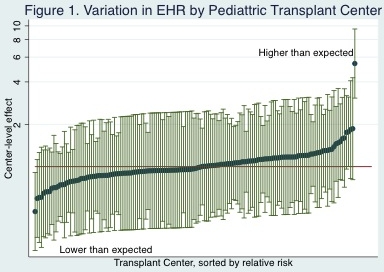Early Hospital Readmission Following Pediatric Kidney Transplantation.
Surgery, Johns Hopkins University, School of Medicine, Baltimore, MD.
Meeting: 2016 American Transplant Congress
Abstract number: 228
Keywords: Kidney transplantation, Outcome, Pediatric
Session Information
Session Name: Concurrent Session: Kidney: Pediatrics
Session Type: Concurrent Session
Date: Monday, June 13, 2016
Session Time: 2:30pm-4:00pm
 Presentation Time: 2:42pm-2:54pm
Presentation Time: 2:42pm-2:54pm
Location: Room 311
BACKGROUND: Approximately 31% of all adult kidney transplant (KT) recipients experience early hospital readmission and it is associated with inferior post-KT survival. Given the significant impact of EHR in adult KT recipients, it is crucial to characterize EHR among pediatric KT recipients and identify which recipients are at highest risk.
METHODS: We used USRDS data to study 2,334 pediatric Medicare primary pediatric (age<18) KT recipients from December 1999–October 2011. EHR was any hospitalization within 30 days of initial KT discharge. Modified Poisson regression was used to determine the association between readmission and patient-level characteristics (age, sex, race, PRA, prior transplant, pre-emptive transplant, cause of ESRD, donor age, donor race, donor type, HLA mismatch, CIT, and length of stay) . Empirical Bayes estimation was used to explore variation in readmission by center.
RESULTS: The crude incidence of EHR for pediatric recipients was 32.2%. The incidence of readmission varied significantly by age and was highest for KT recipients under the age of 2 at 50.6%. Median time from discharge to EHR was 6 days (IQR 2-15). In an adjusted model, age was associated with EHR such that each 5 year decrease in age below 18 was assocaited with a 17% increased risk of readmission (95% CI 1.09-1.26, p<0.001). Peak PRA was associated with EHR such that each 10% increase in PRA was associated a 5% increased risk of EHR (95% CI 1.02-1.08, p=0.003). Other patient-level characteristics were not significantly associated with EHR. After adjusting for patient-level risk, there was little variation in the incidence of readmission across centers.
After adjusting for patient-level risk, there was little variation in the incidence of readmission across centers.
CONCLUSIONS: The youngest pediatric KT recipients and those with elevated PRA are at highest risk for readmission. Efforts to improve transitions of care should focus on these two groups.
CITATION INFORMATION: King E, Kucirka L, McAdams-DeMarco M, Bae S, Segev D. Early Hospital Readmission Following Pediatric Kidney Transplantation. Am J Transplant. 2016;16 (suppl 3).
To cite this abstract in AMA style:
King E, Kucirka L, McAdams-DeMarco M, Bae S, Segev D. Early Hospital Readmission Following Pediatric Kidney Transplantation. [abstract]. Am J Transplant. 2016; 16 (suppl 3). https://atcmeetingabstracts.com/abstract/early-hospital-readmission-following-pediatric-kidney-transplantation/. Accessed February 13, 2026.« Back to 2016 American Transplant Congress
